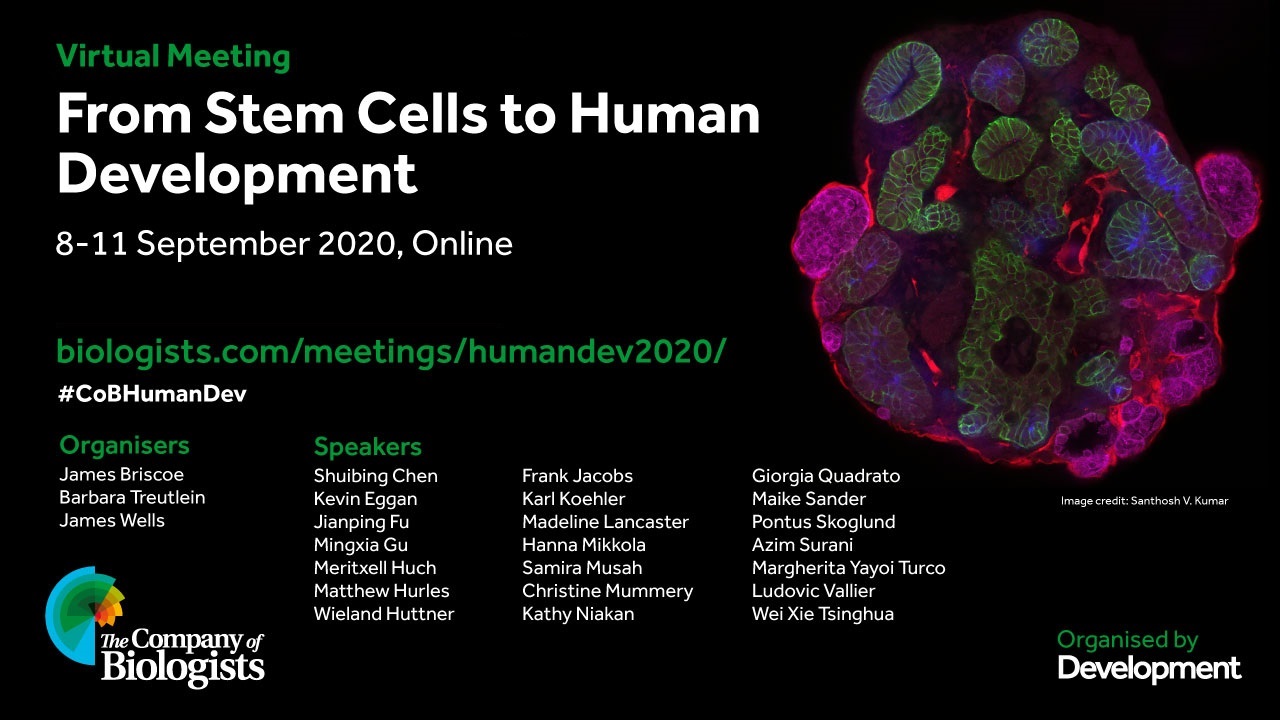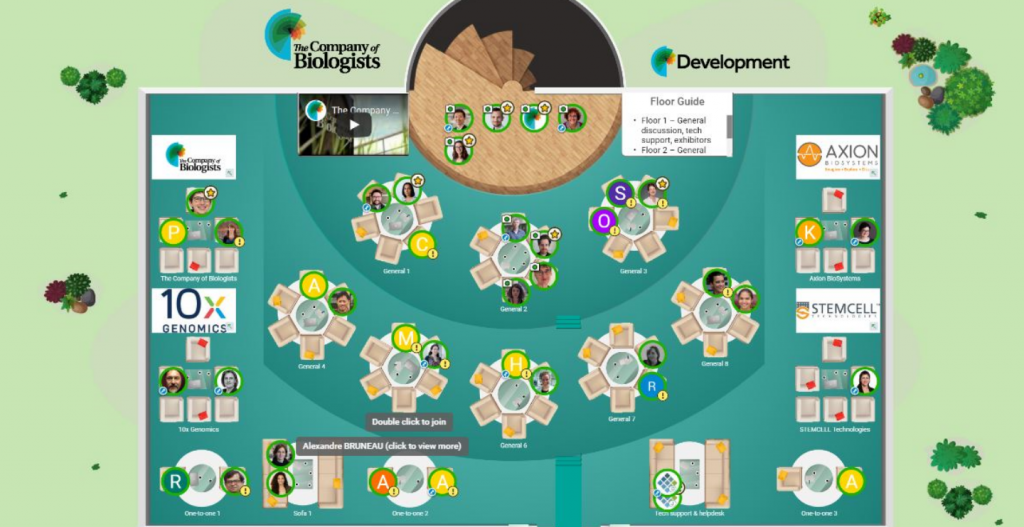Meeting Report: From Stem Cells to Human Development
Posted by Mustafa Guven, on 21 October 2020
Mustafa Güven gives a student’s perspective on Development’s recent virtual meeting: From Stem Cells to Human Development. Below the piece you’ll also find Mustafa’s Turkish translation of the report. For a ‘behind the scenes’ look at the meeting, go here.
As a fourth-year medical student from Van, Turkey, I have witnessed birth and death on the same day. It is interesting how the two most certain things in human life bring the most joy and sadness. But between birth and death, these two inevitable events, change and development never stop.
I am fascinated by how development can occur without any problems, where even minor troubles can be fatal. And here we are, alive and full of passion to understand development and the “troubles” better.

Embryology was by far my favorite lesson in my years studying basic medicine. I would always sit in the front of class and listen to the lectures as if I was enchanted. I continued to learn more about development in the following years, and so it was a wonderful opportunity to attend the virtual “From Stem Cell to Human Development” meeting, hosted by the journal Development on 8-11 September. I wasn’t sure if my knowledge was sufficient to benefit from this meeting but I wanted to take my chances. Also, I was very nervous before the meeting because I had not attended a meeting where many great scientists that I read works of would be close enough to say ‘hi’ to, at least virtually. Thanks to the interactive environment of the platform used, I wasn’t nervous after the first day.

Although online conferences might not be as efficient as regular ones, I think they offer important opportunities. In normal times, I would not have been able to attend this congress, mainly because of economic reasons and also because of my studies. I also think that online meetings will become part of every conference, and the quality of them will improve over time. The platform used in this conference, called Remo, was already good quality. There were different floors and tables for different purposes as if it was a real conference building. Two floors were for poster sessions but unfortunately, I could only check out two posters. I have had time to explore more after the meeting finished. The only negative thing I can say is that, although I don’t know why, I had a little difficulty concentrating on pre-recorded talks. I wonder if this is something other people experience?
In each of the sessions I was like “wow, cool!”, but I still would like to highlight some of the talks that really stuck with me.
The meeting started with Wieland Huttner (Max Planck Institute of Molecular Cell Biology and Genetics, Germany) explaining his lab’s research on how the size of the brain, especially the neocortex, increased during evolution. They investigated the effects of the ARHGAP11B gene on basal progenitor cells, which are the driving force in neuronal proliferation, and conducted further experiments on marmosets and human cerebral organoids. The results were exciting: ARHGAP11B is necessary for neuronal proliferation and folding of the neocortex, and exerts its effects through metabolic pathways. I’m looking forward to see the possible clinical applications. I was also amazed by the lab’s extensive collaborations.
This conference was exciting in many ways. Listening to the pioneering scientists developing new methods was one of them. It is exciting because thanks to new methods, I hope we will see rapid developments in treatment in the near future. Samira Musah (Duke University, USA) was one of these researchers. She is working on a relatively little studied but nonetheless vitally important organ: the kidney. After giving shocking statistics about chronic kidney disease, she talked about her group’s research interests and the field’s current limitations. One of the main limitations to study kidney diseases is the lack of physiologically relevant models. Using induced pluripotent stem cells, her lab managed to establish iPSs derived-podocytes (special cells that play crucial roles in filtration). Another important topic they are working on is a currently popular one: the kidney tropism of COVID-19. I hope to read their papers on the subject soon.
Because of my background, I was more interested in the talks related to current clinical applications, which in turn I was able to understand more. In this regard, James Wells (Cincinnati Children’s Hospital, USA) gave a particularly interesting talk. His lab’s discoveries about endocrine cell development in the gastrointestinal tract were remarkable. He showed that the deletion of neurogenin-3 culminates in the loss of enteroendocrine cells of the pancreas and intestines. This loss can cause diabetes and malabsorption. What I found interesting is that they can induce neurogenin-3 and restore the function of these cells. They also discovered the roles of a peptide, PYY, using neurogenin-3 deficient organoids in enteroendocrine cell functions. He talked about how additional PYY can improve malabsorption parameters in mice. These results are very promising for severe malabsorption patients because they require parenteral nutrition for the rest of their lives.
Being able to re-watch the talks was very beneficial, as I could revise the parts that I didn’t understand at first. Also, I couldn’t attend each live session, so I could catch up later. After listening to the talks for the second time, I see that my knowledge wasn’t completely sufficient after all, but I am glad that I pushed myself. I had a chance to get to know amazing scientists and listen to the cutting edge of developmental biology. These all made me look at the future with more hope and enthusiasm, and I hope I can find a chance to attend this meeting again, but this time in person.
Bir Öğrencinin Bakış Açısından: From Stem Cells to Human Development (PDF)
Dördüncü sınıf tıp öğrencisi olarak aynı gün içerisinde doğuma ve ölüme şahit oldum. İnsan hayatında gerçekleşmesi en kesin bu iki olayın en çok neşe ve üzüntüyü getirmesi ilginçtir. Bu iki kaçınılmaz olay arasında değişim ve gelişim ise asla durmaz.
Bir insanın dünyaya gelme sürecinde küçük sorunların bile ölümle sonuçlanabilirken gelişimin sorunsuz bir şekilde tamamlanması beni şaşırtıyor. Biz ise işte burada, hayatta ve insan gelişimini ve “sorunları” daha iyi anlamak için tutkuyla dolu haldeyiz.
Embriyoloji, temel tıp yıllarında açık ara en sevdiğim ders oldu. Sınıfta her zaman en önde oturur ve büyülenmiş bir şekilde dersleri dinlerdim. İlerleyen yıllarda gelişimsel biyoloji hakkında daha çok şey öğrenmeye devam ettim ve 8-11 Eylül tarihlerinde Development Dergisi’nin ev sahipliğinde sanal olarak düzenlenen “From Stem Cells to Human Development” toplantısına katılma gibi harika bir şansım oldu. Bilgilerimin bu toplantıdan yararlanmaya yeterli olup olmadığından emin değildim ama her ne olursa olsun şansımı denemek istedim. Aynı zamanda, toplantıdan önce çok gergindim çünkü makalelerini okuduğum birçok büyük bilim insanının sanal olarak da olsa ‘merhaba’ diyecek kadar yakın olacağı bir toplantıya katılmamıştım. Kullanılan platformun interaktif ortamı sayesinde ilk günden sonra bu gerginlik geçmişti.
Çevrimiçi konferanslar her ne kadar normal konferanslar kadar verimli olmasa da önemli fırsatlar sunduklarını düşünüyorum. Normal zamanlarda bu kongreye hem ekonomik nedenlerden hem de ders dönemim başladığından dolayı katılamazdım. İlerleyen dönemlerde çevrimiçi toplantıların her konferansın bir parçası olacağını ve zamanla kalitesinin artacağını düşünüyorum. Bu konferansta kullanılan Remo adlı platform ise şimdiden çok güzeldi. Sanki gerçek bir konferans binasıymış gibi çeşitli amaçlar için farklı katlar ve masalar vardı. Poster sunumları için de iki kat ayrılmıştı ama maalesef sadece iki poster sunumunu canlı olarak dinleyebildim. Posterleri daha fazla keşfetmek için toplantı bittikten sonra zamanım oldu. Nedenini tam olarak bilmesem de önceden kaydedilmiş konuşmalara konsantre olmakta biraz güçlük çekmem online konferansla ilgili söyleyebileceğim tek olumsuz şey olabilir.
Her konuşmada kendi kendime “vay, çok havalı” dedim ancak bazı konuşmaları ayrıca vurgulamak ve sanal deneyimimi daha detaylı paylaşmak istiyorum.
İlk gün, Wieland Huttner’ın evrim sırasında beynin, özellikle de neokorteksin, boyutunun nasıl arttığına dair laboratuvarlarında yaptıkları araştırmalarını anlatmasıyla başladı. Nöronal proliferasyonda itici güç olan bazal progenitör hücrelerinde ARHGAP11B geninin etkilerini araştırdıklarını, ileri çalışmalar için bir maymun türü olan marmosetler ve insan beyin organoidleri üzerinde ileri deneyler yaptıklarını anlattı. Sonuçlar çok heyecan vericiydi: ARHGAP11B’nin, neokortekste sinir hücrelerinin artması ve neokorteksin katlanması için gerekli olduğunu ve metabolik yolaklar üzerinden etki ettiğini göstermişler. Olası klinik uygulamaları görmek için sabırsızlanıyorum. Laboratuvarlarının dünyanın dört bir yanıyla yaptıkları ortak çalışmalarına da hayran kaldım.
Bu konferans birçok yönden heyecan vericiydi. Yeni yöntemler geliştiren öncü bilim insanlarını dinlemek kesinlikle bunlardan biriydi. Heyecan verici çünkü geliştirilen yeni “yöntemler” sayesinde yakın gelecekte kliniğe yansıyacak hızlı gelişmeler göreceğimizi umuyorum.
Samira Musah da bu araştırmacılardan biriydi. Nispeten az çalışılmış ama yine de hayati önemi olan bir organ üzerinde çalışıyorlar: böbrek. Konuşmasında kronik böbrek hastalığı hakkında şok edici istatistikler verdikten sonra, grubunun araştırma ilgi alanlarından ve alanın mevcut sınırlamalarından bahsetti. Böbrek hastalıkları üzerine çalışmanın ana sınırlamalarından biri fizyolojik şartlara uygun çalışma modellerin olmamasıymış. Laboratuvarında, indüklenmiş pluripotent kök hücreleri (İPSC) kullanarak, podositleri (filtrasyonda önemli rol oynayan özel hücreler) oluşturmayı başardıklarını anlattı. Üzerinde çalıştıkları bir diğer önemli konu ise şu anda popüler olan bir konu: COVID-19’un böbrek tropizmi. Yakın zamanda çalışmalarını okumayı umuyorum.
Güncel klinik pratiklerini değiştirme potansiyeli olan konuşmalar hem tıp arka planımdan hem de bu konuşmaları daha iyi anlayabildiğimden dolayı daha çok ilgimi çekti. Bu bakımdan James Wells’in konuşması özellikle ilginçti. Laboratuvarının gastrointestinal sistemdeki endokrin hücre gelişimi hakkındaki keşifleri dikkat çekiciydi. Neurogenin-3 gen delesyonunun pankreas ve bağırsaklardaki enteroendokrin hücrelerinin kaybıyla sonuçlandığını göstermişler. Bu hücrelerin kaybı şeker hastalığına ve emilim bozukluklarına neden olabilmekte. Neurogenin-3’ü indükleyebilmeleri ve bu hücrelerin işlevini geri kazanabilmelerini göstermeleri en çok heyecan verici kısmıydı. Ayrıca enteroendokrin hücre fonksiyonlarında neurogenin-3 geninden yoksun organoidleri kullanarak bir peptit olan PYY’nin rollerini keşfetmişler. PYY’nin farelere dışardan verilerek malabsorpsiyonla, emilim bozukluğu, ilgili değerleri nasıl iyileştirebildiğinden bahsetti. Bu sonuçlar, ağır emilim bozukluğu olan hastalar için çok umut verici; çünkü hayatları boyunca damar yoluyla beslenmeye ihtiyaç duymaktalar.
Konuşmaların kaydedilmesi de büyük kolaylık sağladı. İlk dinlediğimde anlamadığım kısımların üzerinden geçebildiğim için sunumları tekrar izleyebilmek faydalı oldu. Bir de her canlı oturuma katılamadığım için kaçırdığım konuşmaları daha sonra dinleyebildim. Konuşmaları ikinci kez dinledikten sonra bilgimin tamamen yeterli olmadığını gördüm ancak kendimi zorladığım için mutluyum. Harika bilim insanlarını tanıma ve gelişimsel biyolojinin öncü çalışmalarını dinleme şansım oldu. Bunların hepsi geleceğe daha fazla umut ve şevkle bakmamı sağladı. Umarım bu toplantıya tekrar katılma, lakin bu sefer yüz yüze, şansı bulabilirim.



 (9 votes)
(9 votes)